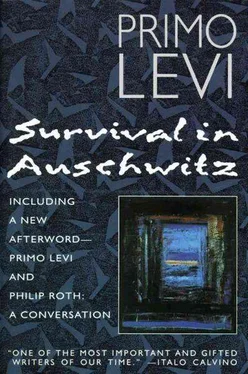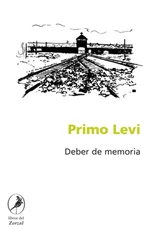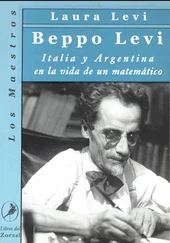The night held ugly surprises.
Lakmaker, in the bunk under mine, was a poor wreck of a man. He was (or had been) a Dutch Jew, seventeen years old, tall, thin and gentle. He had been in bed for three months; I have no idea how he had managed to survive the selections. He had had typhus and scarlet fever successively; at the same time a serious cardiac illness had shown itself, while he was smothered with bedsores, so much so that by now he could only lie on his stomach. Despite all this, he had a ferocious appetite. He only spoke Dutch, and none of us could understand him.
Perhaps the cause of it all was the cabbage and turnip soup, of which Lakmaker had wanted two helpings. In the middle of the night he groaned and then threw himself from his bed. He tried to reach the latrine, but was too weak and fell to the ground, crying and shouting loudly.
Charles lit the lamp (the battery showed itself providential) and we were able to ascertain the gravity of the incident. The boy’s bed and the floor were filthy. The smell in the small area was rapidly becoming insupportable. We had but a minimum supply of water and neither blankets nor straw mattresses to spare. And the poor wretch, suffering from typhus, formed a terrible source of infection, while he could certainly not be left all night to groan and shiver in the cold in the middle of the filth.
Charles climbed down from his bed and dressed in silence. While I held the lamp, he cut all the dirty patches from the straw mattress and the blankets with a knife. He lifted Lakmaker from the ground with the tenderness of a mother, cleaned him as best as possible with straw taken from the mattress and lifted him into the remade bed in the only position in which the unfortunate fellow could lie. He scraped the floor with a scrap of tinplate, diluted a little chloramine and finally spread disinfectant over everything, including himself.
I judged his self-sacrifice by the tiredness which I would have had to overcome in myself to do what he bad done.
23 January. Our potatoes were finished. For days past the rumour had circulated through all the huts that an enormous trench of potatoes lay somewhere outside the barbed wire, not far from the camp.
Some unknown pioneer must have carried out patient explorations, or else someone knew the spot with precision. In fact, by the morning of the 23rd a section of the barbed wire had been beaten down and a double file of wretches went in and out through the opening.
Charles and I left, into the wind of the leaden plain. We were beyond the broken barrier.
‘Dis donc, Primo, on est dehors!’
It was exactly like that; for the first time since the day of my arrest I found myself free, without armed guards, without wire fences between myself and home.
Perhaps 400 yards from the camp lay the potatoes — a treasure. Two extremely long ditches, full of potatoes and covered by alternate layers of soil and straw to protect them from the cold. Nobody would die of hunger any more.
But to extract them was by no means easy work. The cold had made the surface of the earth as hard as iron. By strenuous work with a pickaxe it was possible to break the crust and lay bare the deposit; but the majority preferred to work the holes abandoned by others and continue to deepen them, passing the potatoes to their companions standing outside.
An old Hungarian had been surprised there by death. He lay there like hunger personified: head and shoulders under a pile of earth, belly in the snow, hands stretched out towards the potatoes. Someone came later and moved the body about a yard, so freeing the hole.
From then on our food improved. Besides boiled potatoes and potato soup, we offered our patients potato pancakes, on Arthur’s recipe: rub together raw potatoes with boiled, soft ones, and roast the mixture on a red-hot iron-plate. They tasted of soot.
But Sertelet, steadily getting worse, was unable to enjoy them. Besides speaking with an ever more nasal tone, that day he was unable to force down any food; something had closed up in his throat, every mouthful threatened to suffocate him.
I went to look for a Hungarian doctor left as a patient in the hut in front. When he heard the word diphtheria he started back and ordered me to leave.
For pure propaganda purposes I gave everyone nasal drops of camphorated oil. I assured Sertelet that they would help him; I even tried to convince myself.
24 January. Liberty. The breach in the barbed wire gave us a concrete image of it. To anyone who stopped to think, it signified no more Germans, no more selections, no work, no blows, no roll-calls, and perhaps, later, the return.
But we had to make an effort to convince ourselves of it, and no one had time to enjoy the thought. All around lay destruction and death.
The pile of corpses in front of our window had by now overflowed out of the ditch. Despite the potatoes everyone was extremely weak: not a patient in the camp improved, while many fell ill with pneumonia and diarrhoea; those who were unable to move themselves, or lacked the energy to do so, lay lethargic in their bunks, benumbed by the cold, and nobody realized when they died.
The others were all incredibly tired: after months and years of the Lager it needs more than potatoes to give back strength to a man. Charles and I, as soon as we had dragged the fifty pints of daily soup from the laundry to our room, threw ourselves panting on the bunks, while Arthur, with that domesticated air of his, diligently divided the food, taking care to save the three rations of ‘rabiot pour les travailleurs’ and a little of the sediment ‘pour les italiens d’à cote’
In the second room of the contagious ward, likewise adjoining ours and occupied mainly by tuberculosis patients, the situation was quite different. All those who were able to had gone to other huts. Their weakest comrades and those who were most seriously ill died one by one in solitude.
I went in there one morning to try and borrow a needle. A patient was wheezing in one of the upper bunks. He heard me, struggled to sit up, then fell dangling, head downwards over the edge towards me, with his chest and arms stiff and his eyes white. The man in the bunk below automatically stretched up his arms to support the body and then realized that he was dead. He slowly withdrew from under the weight and the body slid to the ground where it remained. Nobody knew his name.
But in hut 14 something new had happened. It was occupied by patients recovering from operations, some of them quite healthy. They organized an expedition to the English prisoner-of-war camp, which it was assumed had been exacuated. It proved a fruitful expedition. They returned dressed in khaki with a cart full of wonders never seen before: margarine, custard powders, lard, soya-bean flour, whisky.
That evening there was singing in hut 14.
None of us felt strong enough to walk the one mile to the English camp and return with a load. But indirectly the fortunate expedition proved of advantage to many. The unequal division of goods caused a reflourishing of industry and commerce. Our room, with its lethal atmosphere, transformed itself into a factory of candles poured into cardboard moulds, with wicks soaked in boracic acid. The riches of hut 14 absorbed our entire production, paying us in lard and flour.
I myself had found the block of beeswax in the Elektromagazin; I remember the expression of disappointment of those who saw me carry it away and the dialogue that followed:
‘What do you want to do with that?’
It was inadvisable to reveal a shop secret; I heard myself replying with the words I had often heard spoken by the old ones of the camp, expressing their favourite boast — of being hardboiled, ‘old hands’, who always knew how to find their feet: ‘Ich verstehe verschiedene Sachen.’ I know how to do many things…
Читать дальше












